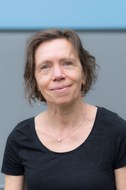Studieninteressierte
Weitere Informationen finden Sie auf unserer englischen Seite.
 © Martin Knaut
© Martin Knaut
Studienfachberatung Nanoelectronic Systems
NameFrau Dipl.-Phys. Manuela Tetzlaff
Eine verschlüsselte E-Mail über das SecureMail-Portal versenden (nur für TUD-externe Personen).
Besucheradresse:
Barkhausen-Bau, Raum 161 Helmholtzstr. 18
01069 Dresden
None
Sprechzeiten:
- Dienstag:
- 13:00 - 15:00
und nach Vereinbarung.
Telefonische Sprechzeiten:
- Donnerstag:
- 13:00 - 14:00
